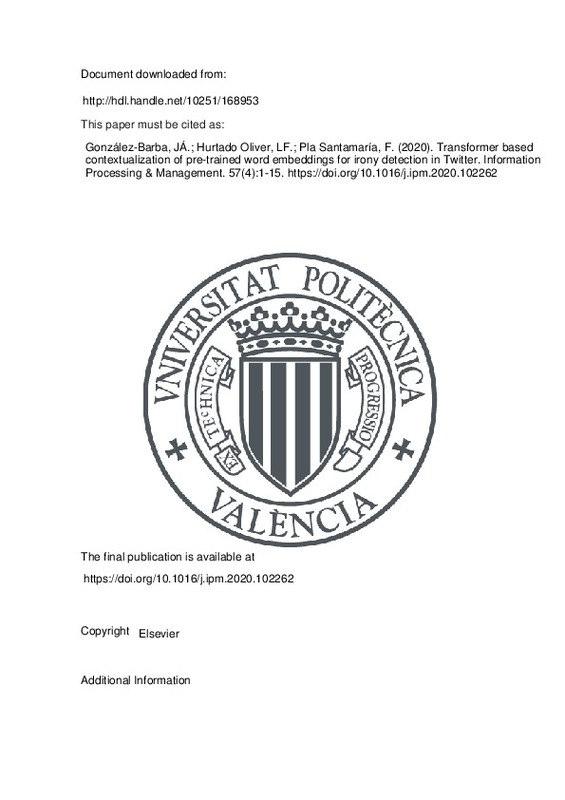JavaScript is disabled for your browser. Some features of this site may not work without it.
Buscar en RiuNet
Listar
Mi cuenta
Estadísticas
Ayuda RiuNet
Admin. UPV
Transformer based contextualization of pre-trained word embeddings for irony detection in Twitter
Mostrar el registro completo del ítem
González-Barba, JÁ.; Hurtado Oliver, LF.; Pla Santamaría, F. (2020). Transformer based contextualization of pre-trained word embeddings for irony detection in Twitter. Information Processing & Management. 57(4):1-15. https://doi.org/10.1016/j.ipm.2020.102262
Por favor, use este identificador para citar o enlazar este ítem: http://hdl.handle.net/10251/168953
Ficheros en el ítem
Metadatos del ítem
| Título: | Transformer based contextualization of pre-trained word embeddings for irony detection in Twitter | |
| Autor: | González-Barba, José Ángel | |
| Entidad UPV: |
|
|
| Fecha difusión: |
|
|
| Resumen: |
[EN] Human communication using natural language, specially in social media, is influenced by the use of figurative language like irony. Recently, several workshops are intended to explore the task of irony detection in ...[+]
|
|
| Palabras clave: |
|
|
| Derechos de uso: | Reconocimiento - No comercial - Sin obra derivada (by-nc-nd) | |
| Fuente: |
|
|
| DOI: |
|
|
| Editorial: |
|
|
| Versión del editor: | https://doi.org/10.1016/j.ipm.2020.102262 | |
| Código del Proyecto: |
|
|
| Agradecimientos: |
This work has been partially supported by the Spanish Ministerio de Ciencia, Innovacion y Universidades and FEDER founds under project AMIC (TIN2017-85854-C4-2-R) and the GiSPRO project (PROMETEU/2018/176). Work of Jose-Angel ...[+]
|
|
| Tipo: |
|







![[Cerrado]](/themes/UPV/images/candado.png)


